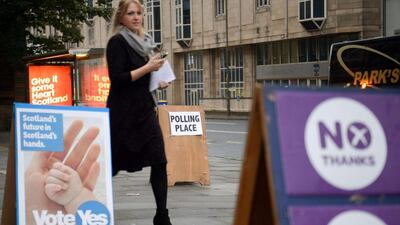EDINBURGH // Scots held the fate of the United Kingdom in their hands on Thursday as they voted in a referendum to decide whether to unravel a marriage with England that built an empire but has increasingly been felt by many Scots as stifling and one-sided.
The question on the ballot paper is simplicity itself: “Should Scotland be an independent country?” Yet it has divided Scots during months of campaigning.
As polls opened, the mood was electric, tinged by nervousness. Queues formed outside polling stations with the “Yes” and “No” campaigns still vying to the last minute to win over voters in a blizzard of flags, posters and badges.
For some, this was a day they had dreamed of for decades.
“Fifty years I fought for this,” said Isabelle Smith, 83, a Yes supporter in Edinburgh’s district of Newhaven, a former fishing port. “And we are going to win. I can feel it in my bones.”
For Ms Smith, who went to the polling station decked out in a blue-and-white pro-independence shirt and rosette, statehood for Scotland was a dream nurtured during three decades living in the United States with her late husband.
“The one thing America has that the Scots don’t have is confidence,” said Ms Smith, who returned to Scotland years ago. “But they’re getting it, they’re walking tall.
“No matter what, Scotland will never, ever be the same again.”
The referendum is the culmination of almost two years of competing arguments over the viability of an independent Scotland, its economic well-being, currency and international standing.
“I don’t think it’s fair to make it about Scottishness,” said Emma Hodcroft, 28, a HIV researcher from Edinburgh, wearing earrings depicting the Scottish flag and the word “no.” “I love my country, but I don’t think emotion is the best way to make a decision; you need to know the facts.”
Others breathed a sigh of relief after a long and sometimes bitter campaign.
“The damage this referendum has done to Scotland, splitting families, splitting communities, is really quite frightening,” said Alistair Eastern, 60, a pensioner.
“I think the bitterness that this campaign has caused is going to last a long, long time.”
Many opponents of independence agreed that the campaign had reinvigorated Scottish democracy.
“I support the No side, but it’s been a fascinating, worthwhile discussion about Scotland’s future,” said David Clarke, a writing consultant.
“If it’s a No it’s a win-win situation. If it’s a Yes, we will have to deal with the fact that it’s a Yes.”
First minister Alex Salmond, leader of the independence campaign, cast his vote near his home in north-eastern Scotland.
He was greeted by flag-waving schoolchildren and tartan caps as he voted in the remote farming village, where the man who could be the father of independence is just “a nice bloke”.
Wearing a tartan tie, a navy checked suit with a “Yes” badge pinned to his lapel, Mr Salmond was all smiles as he arrived at Ritchie Hall to cast the ballot he has spent a political lifetime campaigning for.
He was flanked by two first-time female local voters.
Lea Pirie, 28, is pregnant, while 17-year-old Natasha McDonald faced another moment of destiny later in the day: her driving test.
Mr Salmond put his arms around them as he posed for photographs.
“We’re now in the hands of the Scottish people and there’s no safer place to be,” Salmond told AFP after voting.
“I think the message is for Scotland: let’s do it now.”
Pro-independence forces got a last-minute boost from tennis star Andy Murray, who signalled his support of the Yes campaign in a tweet to his 2.7 million followers early in the day.
Anti-independence leaders including former prime minister Gordon Brown have implored Scots not to break their links with the rest of the United Kingdom.
At Edinburgh polling stations, excitement vied with apprehension about Scotland’s choice.
Thomas Roberts said he had voted Yes because he felt optimistic about its future as an independent country.
“Why not roll the dice for once?” he said.
Once the polls close, ballot boxes will be transported to 32 regional centres for counting.
Financial consultant Michael MacPhee, a No voter, said he would observe the returns coming in “with anxiety.”
Scottish independence was “the daftest idea I’ve ever heard,” he said.
* Associated Press with additional reporting by Agence France-Presse and Bloomberg

